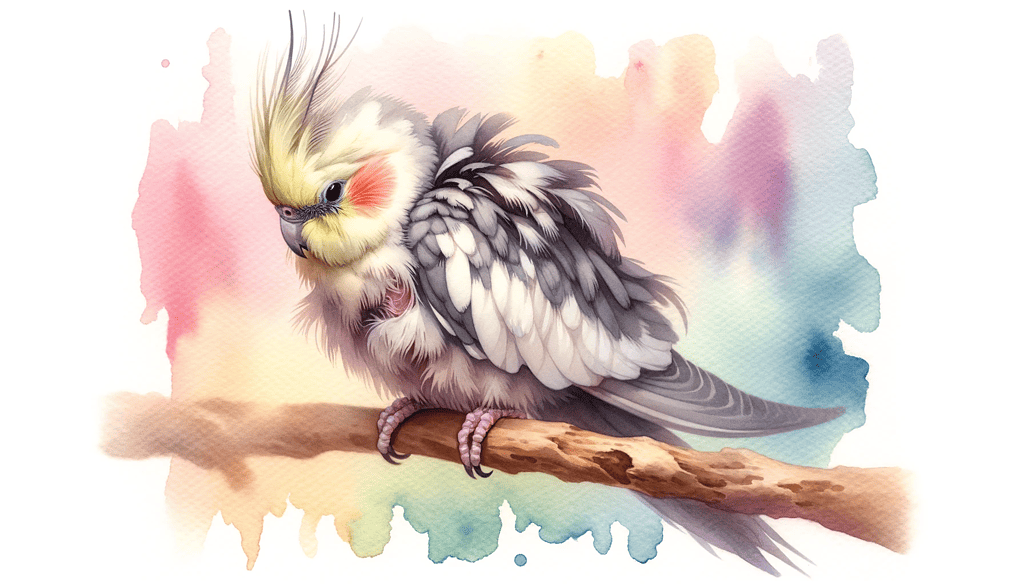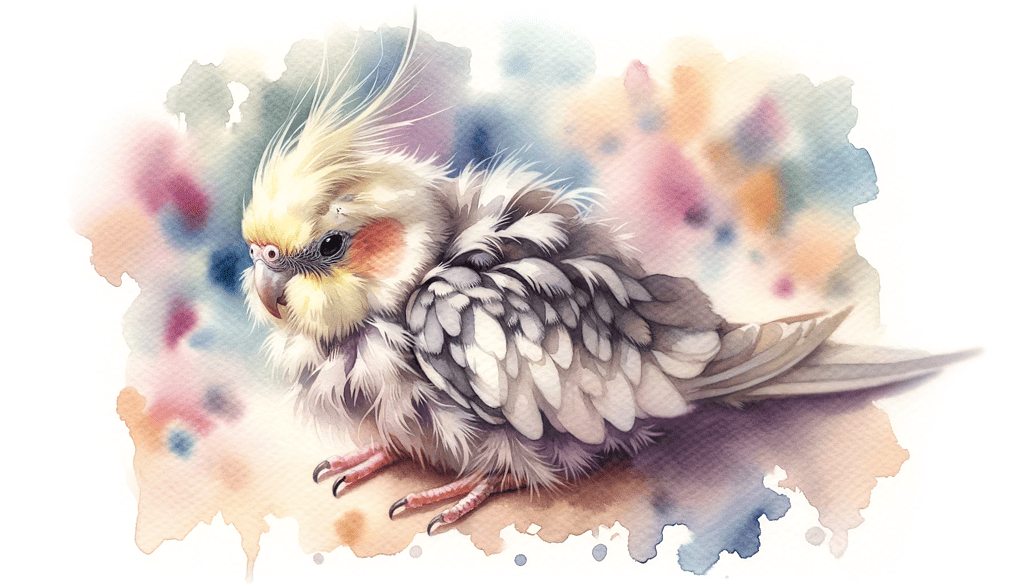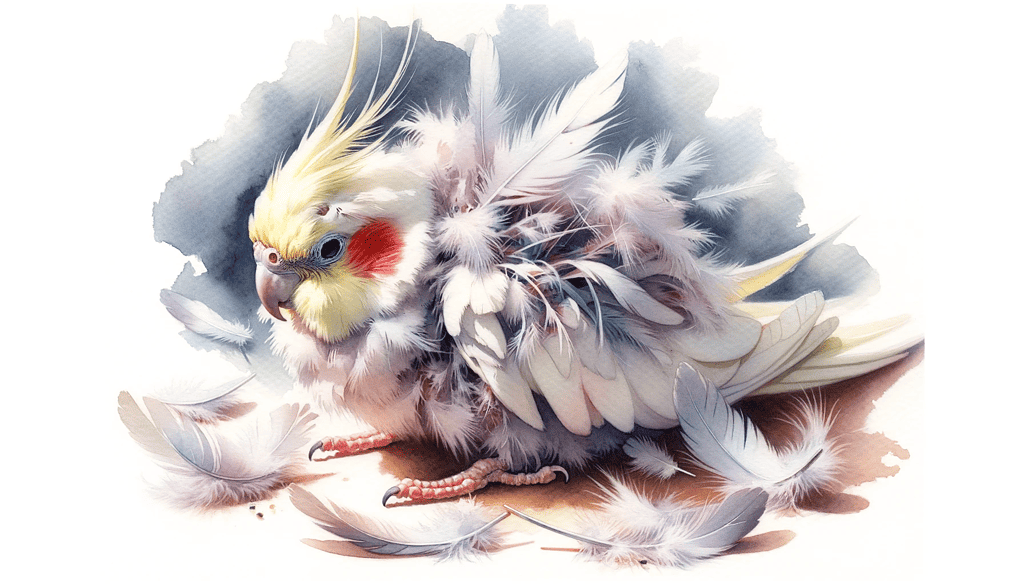
Cockatiels, with their vibrant personalities and striking plumage, are a favorite among bird enthusiasts. However, like all creatures, they have their unique set of challenges. One such challenge that often leaves owners puzzled is the mysterious case of feather loss. Whether it’s a natural molting process or a sign of distress, understanding the reasons behind this phenomenon is crucial for every cockatiel caretaker.
As a general rule, feather loss in cockatiels can be attributed to various factors, including natural molting, environmental changes, diet, and underlying health conditions. Ensuring a balanced diet, regular check-ups, and a stress-free environment can significantly reduce excessive feather loss.
Intrigued about the intricacies of feather loss in cockatiels? Dive in as we decode this phenomenon from a vet’s perspective, offering insights and actionable tips to ensure your feathered friend’s well-being. Stay with me, and let’s embark on this enlightening journey together!
Natural and Healthy Feather Loss
Before diving into the specifics, it’s essential to understand that not all feather loss is a cause for concern. Just like humans shed skin cells, cockatiels also undergo natural processes that result in feather loss.
Molting
Molting is a natural and regular occurrence in the life of a cockatiel. It can be likened to how humans shed old fingernails to make way for new growth. This process is influenced by seasonal changes, which can impact the frequency and intensity of molting. Typically, molting begins when a cockatiel is between six to twelve months old. While it can happen throughout the year, heavy molting usually occurs twice annually. During this period, cockatiels may experience discomfort and expend more energy. If you observe pin feathers replacing the fallen ones, it’s a clear sign of molting. However, continuous feather loss post-molting indicates another underlying issue.
Reasons for Natural Feather Loss:
- Seasonal changes: As mentioned, the changing seasons can influence the molting process.
- Replacement of damaged feathers: Just as we shed damaged skin cells, cockatiels shed damaged feathers.
- Migration, reproductive cycle, and nutritional status in the wild: In the wild, these factors can influence feather loss, although they might be less relevant for domesticated birds.
- Regulation of body temperature: Sometimes, cockatiels might shed feathers to regulate their body temperature, especially during hotter periods.
Supporting Your Cockatiel During Molting
- Importance of a stress-free environment: Stress can exacerbate the molting process, making it essential to provide a calm environment.
- Adjusting the diet: During molting, cockatiels expend more energy. To compensate, it’s advisable to increase their food intake by about 25%. This includes adding cereals, fresh fruits, and vegetables to their diet.
- Providing privacy: Sometimes, cockatiels need a little privacy. Consider covering a part of their cage to give them some solitude.
- Importance of humidity: Misting the cockatiel’s feathers or offering birdbaths can help them manage the heat and promote healthy feather growth.
Feather Plucking

Transitioning from natural feather loss, another concerning aspect that many cockatiel owners encounter is feather plucking. This behavior is not only distressing to witness but can also indicate underlying health or environmental issues.
Signs of Feather Plucking
Feather plucking in cockatiels can be distressing for both the bird and its owner. It’s essential to recognize the signs early to address the underlying causes. Most evident signs are:
- Uneven distribution of feather hairs across the body.
- Visible signs of skin irritation or redness.
- Increased itching or scratching behavior.
- Excessive preening or grooming, especially around the beak area.
- Potential underlying causes can include skin infections or mineral deficiencies.
| Aspect | Natural Feather Loss | Feather Plucking |
| Appearance | Even shedding, pin feathers visible | Large bald patches, damaged feathers |
| Frequency | Seasonal, usually twice a year | Can be continuous, not limited to molting season |
| Affected Areas | All over the body | Often localized, especially chest and |
Causes of Feather Plucking
- Loneliness and lack of social interaction: Cockatiels are social birds and thrive on interaction. Prolonged isolation can lead to stress and feather plucking.
- Organ or skin-related issues: Any discomfort or itchiness can cause a bird to pluck its feathers.
- Overweightness and liver diseases: Health issues can manifest externally through behaviors like feather plucking.
- Metallic poisoning: Cockatiels can sometimes ingest metals from their cages or toys, leading to toxicity and subsequent feather plucking.
- Lack of sleep and rest: Just like us, cockatiels need their beauty sleep. Disrupted sleep cycles can stress them out.
- Absence of a mate or partner: In the wild, cockatiels often have partners. The absence of one can lead to loneliness and stress.
- Environmental changes: Any change in their environment, be it a new feed, medication, presence of parasites, allergies, or even neglect, can trigger feather plucking.
Illness and Malnourishment
While feather plucking can be distressing, it’s also crucial to understand that certain illnesses and malnourishment can lead to feather loss in cockatiels.
- Bacterial or viral infections, like the psittacine beak and feather disease, are common causes.
- Skin infections, such as scabies or eczema, can lead to excessive preening and feather loss.
- Mineral deficiencies can lead to frayed feathers, causing uneven feather hairs. Such deficiencies can result in itching and skin irritation, prompting feather plucking.
Recommendations for a Healthy Diet
- Ensure a mix of seeds, pellets, fruits, and vegetables in their diet.
- Limit sunflower seeds as they can be fatty.
- Provide fresh water daily and ensure it’s free from contaminants.
- Avoid foods like chocolate, caffeine, and avocado, which can be toxic for birds.
- Regularly monitor their droppings. Changes in color or consistency can indicate health issues.
Helping a Cockatiel with Feather Loss

As we delve deeper into the world of cockatiels, it’s essential to understand the various interventions that can assist these beautiful birds during their feather loss episodes. Whether it’s due to natural molting or other underlying issues, there are several ways to support your feathered friend.
- Dietary Adjustments: During molting, cockatiels undergo a highly energy-intensive process. To compensate for the lost energy, it’s advisable to increase the cockatiel’s diet by 25%.
- Medical Intervention: If an infection or parasites cause feather loss, it’s crucial to consult a veterinarian. They will prescribe the appropriate medication and check for any parasites on the cockatiel.
- Environmental Adjustments: Maintaining an ideal room temperature of 70-80°F (21-27°C) and providing adequate lighting can prevent constant molting and ensure your cockatiel’s comfort.
- Social Interaction: Cockatiels are inherently social creatures. Spending quality time with them can alleviate stress. If you’re often away, consider introducing another cockatiel for companionship.
- Safe Cages: Opt for aluminum or steel cages to prevent metal poisoning. These cages aren’t painted, ensuring your bird won’t ingest toxins even if it nibbles on the cage.
- Incorporating Fresh Foods: Fresh fruits and vegetables promote feather growth. They provide essential vitamins like A, D, and E. Vitamin A, in particular, aids in keratin production, crucial for feather formation.
Conclusion
Understanding and addressing feather loss in cockatiels is paramount for every bird enthusiast. Understanding the reasons, whether natural or due to underlying issues, can make a world of difference in the care we provide. It’s heartwarming to witness the bond between a bird and its owner, especially when they work together to overcome such hurdles.
I hope you found this article enlightening. Did you enjoy reading it? I’d love to hear your thoughts in the comments below. If you found this information valuable, please consider sharing it with fellow bird lovers. Your feathered friend deserves the best!
Frequently Asked Questions
Why is my cockatiel molting more frequently than usual?
The primary distinction between molting and plucking is the number of fallen feathers. A cockatiel will lose a few feathers at a time during molting. Excessive feathers in the cage might indicate plucking.
What can cause my cockatiel to pluck its feathers excessively?
Factors like infections, parasites, stress, environmental changes, and lack of social interaction can lead to excessive feather plucking
How can I support my cockatiel during its molting period?
Increase its diet, provide a comfortable environment, and ensure regular check-ups with a veterinarian.
